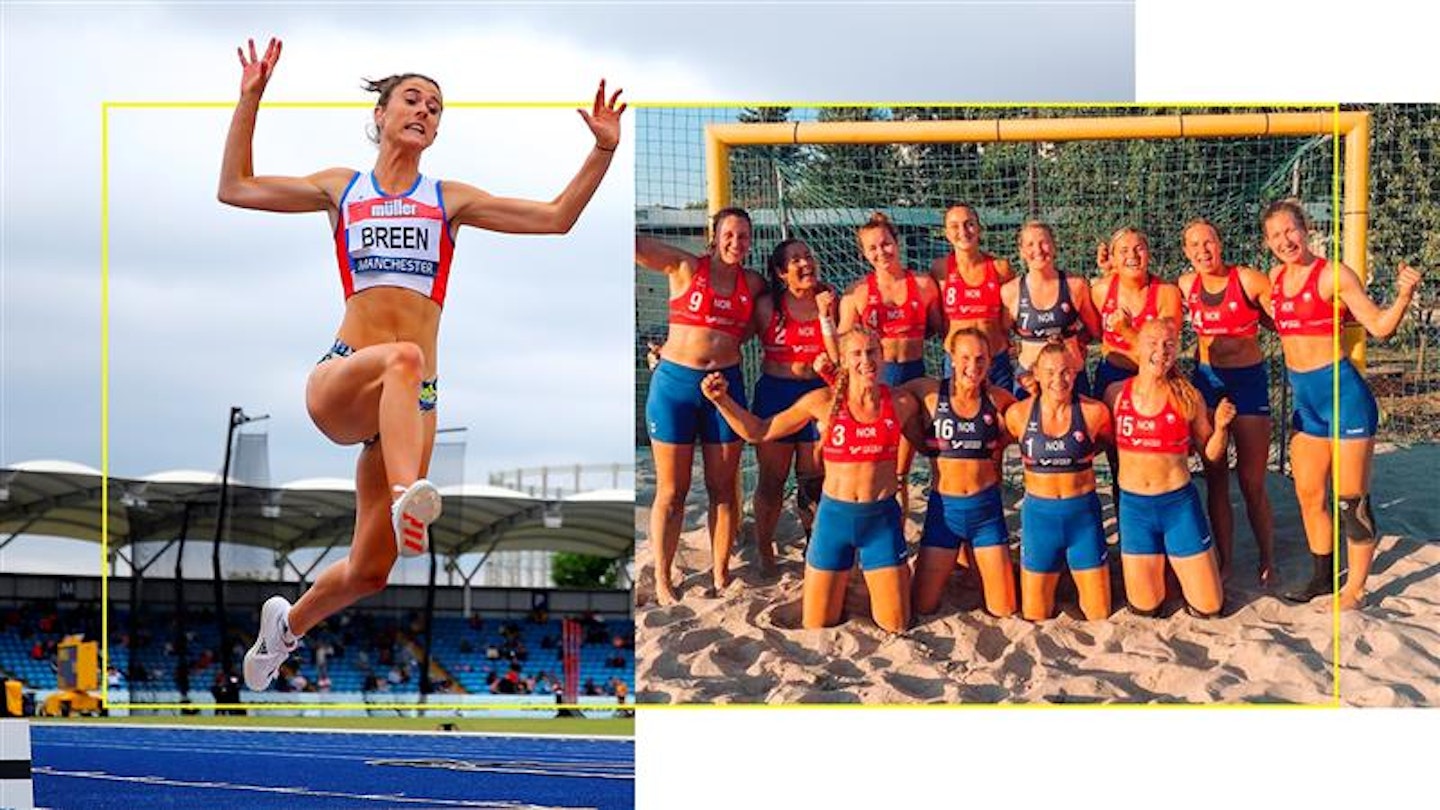Update: Pink has offered to pay the fine against the Norwegian women's beach handball team, which they were given for choosing to wear shorts akin to the male team's uniform instead of bikini bottoms.
Earlier, Grazia's Anna Silverman wrote about the sexist disparity not just between how male and female athletes are treated, but across women's sporting uniforms generally...
With a few days to go until Olympic starting guns are fired (pandemic-permitting, it’s all looking a bit precarious right now), there’s a depressing inevitability when it comes to two stories that have emerged this week. The first involves double Paralympic world champion sprinter and long jumper Olivia Breen. Well, Olivia Breen’s shorts to be precise.
Olivia, who will be competing at the Paralympics in Tokyo next month, was left ‘speechless and disappointed’ after a female official told her that her sprint briefs were ‘too short and inappropriate’ after she finished an event at the English Championships on Sunday.
She wrote on Twitter that it made her question whether a male competitor would be similarly criticised. ‘Olivia Breen shorts' and 'Olivia Breen briefs’ started trending on Google soon after.
‘I recognise that there needs to be regulations and guidelines in relation to competition kit,’ she wrote, ‘but women should not be made to feel self-conscious about what they are wearing when competing, but should feel comfortable and at ease.’
Meanwhile, in the same week, Norway's beach handball team have been fined £1,295 for ‘improper clothing’ because they chose to wear shorts instead of skimpy bikini bottoms at the European Beach Handball Championships. They made the stand and accepted the fine to prove a point.
Kare Geir Lio, the head of Norway’s Handball Federation, told news agency AFP that any penalty would be paid but: ‘It should be a free choice within a standardised framework. The most important thing is to have equipment that athletes are comfortable with.’
What's more, politicians and campaigners are still battling Olympic organisers to lift a ban on swim caps for natural Black hair, which excludes people of colour - specifically Black women. The hats, made by Soul Cap, were rejected by the International Swimming Federation (Fina) because they said they didn’t fit ‘the natural form of the head’. It’s a swim cap, not a pair of flippers.
These events show how prevalent policing still is when it comes to female athletes’ clothes and demonstrates a total disregard for women’s comfort, safety and needs. Either we’re asked to cover up more or to bare all in skimpy bikinis. The only thing this bares is double standards, as men are subjected to far less scrutiny.
The contradictory nature of these criticisms also spotlights just how much of a corner women are backed into. Wear the shorts you feel comfortable in and they’re deemed ‘too short and revealing’ (read: a woman’s body is essentially inappropriate and has no place being visible in sport). But try and cover up because you don’t feel comfortable in skimpy bikini bottoms and having far more on show than your male counterparts, and it’s a somehow a different story ... and you’re whacked with a fine.
It's farcical, and even a slight blessing, that both of these stories have broken in the same week, highlighting just how impossible the requirements are for women in sport who are literally stuck in a stalemate with the clothing police.
There’s a long, ugly history when it comes to female athletes’ clothes being criticised and judged. At the 2018 French Open, Serena Williams wore a custom-made black catsuit. The president of the French Tennis Federation said afterwards the outfit ‘wouldn’t be back’, ‘went too far’ and didn’t ‘respect the game and the place.’
They might as well spell it out: women should just be grateful to be here in the first place, now do what we say.
In 2018, U.S. Open officials gave a code violation to French tennis player Alizé Cornet after she took her shirt off on the court when she realised it was on backwards, and briefly exposed her sports bra. According to Fast Company, legendary tennis star Billie Jean King was often criticised for her 'radical' outfits in the 1970s - radical being short skirts and sleeveless polo shirts. What did they expect her to play in - a floor-length dress?
And this doesn’t just happen to women in sport. Our sartorial choices are unequally scrutinised everywhere from politicsto the boardroom. Funny how they’re all areas where you can imagine certain men consider women still don’t ‘belong’ and need to earn their place at the table/on the track/in the dispatch box. They might as well spell it out: women should just be grateful to be here in the first place, now do what we say.
It’s time to look at outdated uniforms and update archaic opinions about immodesty and conventions. Let’s hope sportswomen keep pushing back so today’s ‘radical’ briefs feel completely normal tomorrow.
As a bonus – perhaps more of interest to those who only pretend to care about women’s wellbeing - we actually perform our best when we’re most comfortable, too.
READ MORE: Candice Brathwaite: 'Black Hair Has Been Policed And Ostracised For Too Long'
